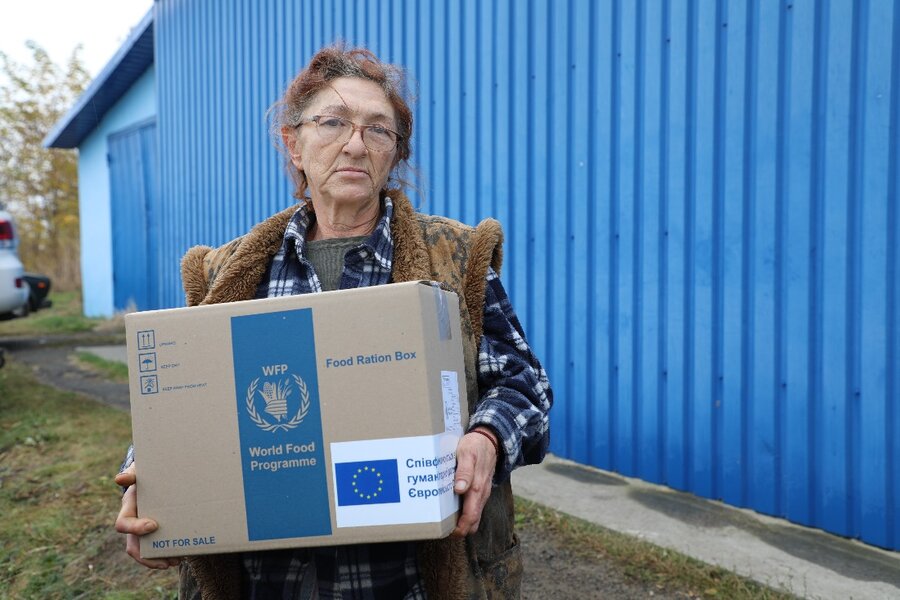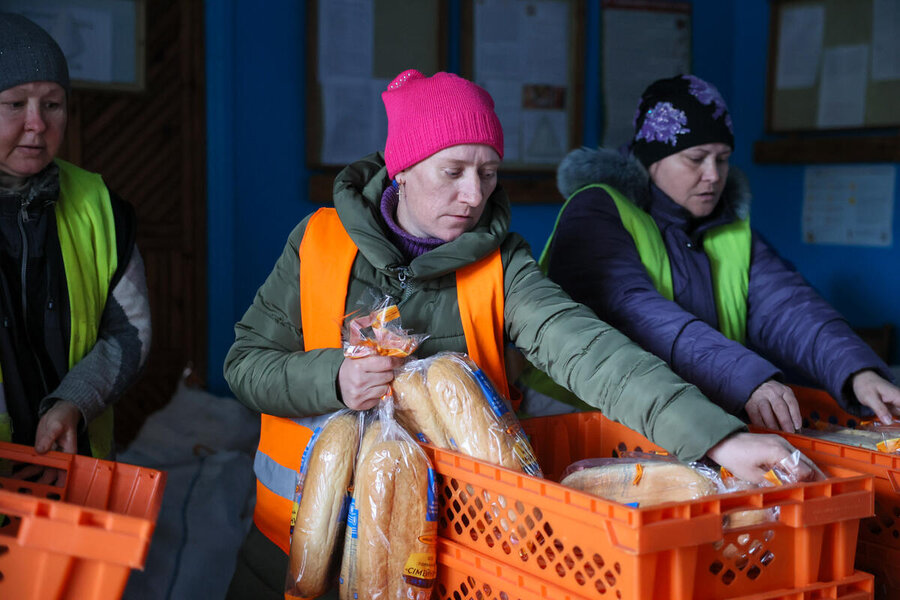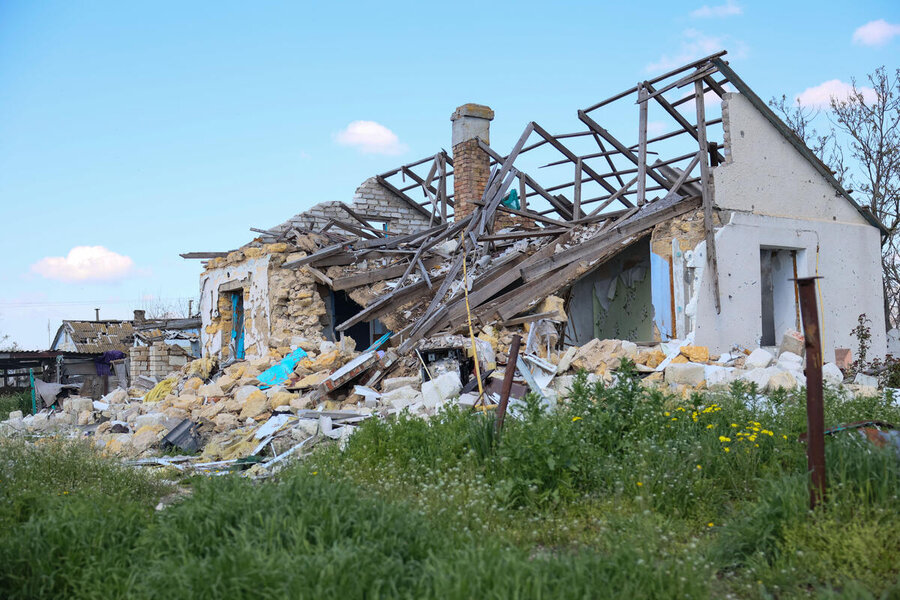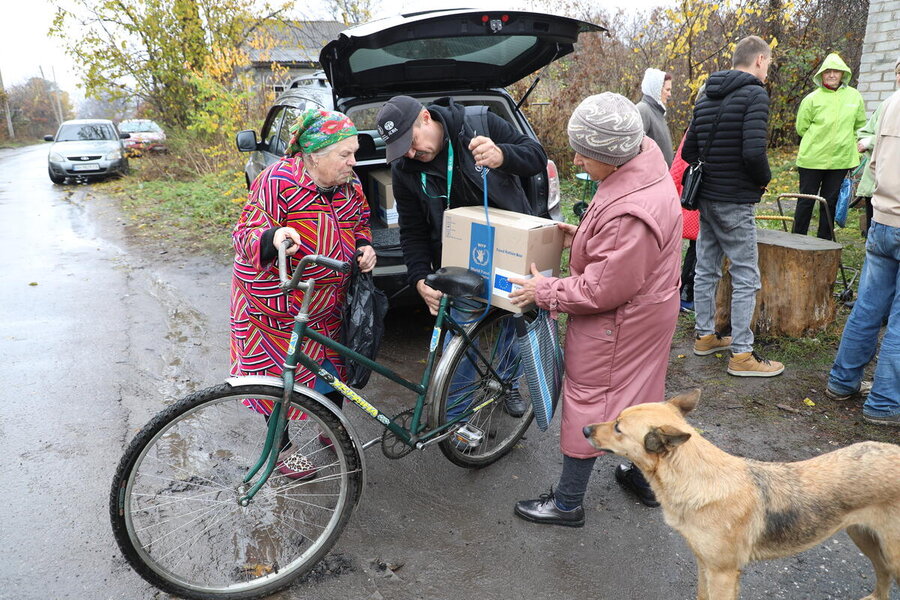As winter and war grip Ukraine, families on the frontlines find sustenance

On a cold and gloomy day in Veselianka village, in Ukraine’s southeastern Zaporizhzhia region, a few dozen people gather at a food distribution point where the World Food Programme (WFP) provides monthly food assistance. Hands tucked in their pockets to keep warm, the villagers’ chatter and jokes fill the windless air and cover the muted thud of shells falling in the distance.
Not so long ago, Veselianka was home to nearly 1,000 people, many of whom harvested sunflower, wheat or oilseed rape from the region’s rich, dark soil. But when fighting reached its outskirts in March 2022, and the sounds of war grew louder and louder, almost half of its residents fled.
‘Our land was ready to be cultivated, but we could no longer stay – the house was completely unprotected from the wind and the cold’
In Ukraine, many continue to live near areas of intense fighting. (Still, “there is no place like home,” says Alla, who lives in Veselianka with her husband.)
Attached to their land and their homes, or afraid of prolonged displacement, they remain despite the incredible dangers. Others are forced to return to their farms and livelihoods after running out of options to make ends meet while on the move.
With support from the EU and other donors, WFP has been ramping up its assistance to these families and others across Ukraine, to reach 2.4 million people each month this winter with food or cash grants. Yet WFP’s Ukraine operations are only 54 percent funded, and require an additional US$180 million for the next six months.

Food distributions, either of 30-day food boxes of a mix of staples, or of fresh bread and canned goods, focus on areas near the frontlines, like Veselianka. More than half-a-million people received such rations in January alone.
The assistance is badly needed. The war continues to disrupt production and supply chains in Ukraine, making access to food unreliable in many eastern and southern areas. Around one in five Ukrainians is food insecure, with those near the frontlines facing particularly dire conditions.
‘There was a time we were without electricity for three to four days, shelling could be heard constantly. I only thought of my children and grandchildren’
“Life hasn’t gotten better or easier for Ukrainians this year – the war continues unabated, with strikes on civilian areas intensifying in recent weeks, continued damage to infrastructure, and more and more civilian casualties,” says Marianne Ward, WFP’s Country Director ad interim for Ukraine.
“People living near the frontlines have faced the worst of it”, she adds, “and they count on the continued support of humanitarian organizations to make ends meet.”
Home on the frontlines
Early into the war, Alla and her husband considered joining the exodus from Veselianka as well, after initially wanting to stay. Their decision was hastened when a missile landed in their yard, destroying the windows and roof of their family home, and forcing them out.
“We were in despair,” recalls Alla with tears in her eyes. “Our land was ready to be cultivated, but we could no longer stay - the house was completely unprotected from the wind and the cold.”
The couple’s daughter hosted them for a while. But weeks later, they were back.
“We could not stand being away for too long,” Alla says.

With the conflict approaching its third year, the explosions have become background noise for Alla and her neighbours. They have adapted to life on the frontlines, stocking makeshift shelters with water, snacks, and warm clothing.
Last winter was particularly harsh, with freezing temperatures, power outages, and soaring heating costs. Most of the nearby shops had empty shelves. The people of Veselianka did their best to prepare and withstand.
“There was a time when we were without electricity for three to four days,” Alla recalls. “Shelling could be heard constantly. I only thought of my children and grandchildren. I called my daughter all the time, to make sure they were safe.”
Another hard winter
On this third winter of war and with prices continuing to rise, families like Alla’s are again struggling to afford food, heat and home repairs. Humanitarian assistance from WFP and others helps to fill the gaps.

“The prices are rising all the time,” Alla says. “Our only income is our two pensions. How can we afford it all?”
For her and many others on the frontlines, WFP’s food box – consisting of staple foods such as canned beans or meat, pasta, wheat flour, sunflower oil, buckwheat, sugar and salt – is a lifesaver, especially for elderly people living alone.
“The canned meat and cereals – these are the basis for us,” Alla says. “At least we don’t have to worry about food.”
In the mornings she bakes traditional pancakes, known as mlyntsi using WFP-supplied flour.
“In the evening we sip on tea and we plan the future,” Alla says with a smile. “One must have plans – no matter what.”
Thanks to the European Union and other partners, WFP continues to provide life-saving food and cash assistance to the most vulnerable Ukrainians, as well as support to the humanitarian response with common logistics and telecommunication services.
